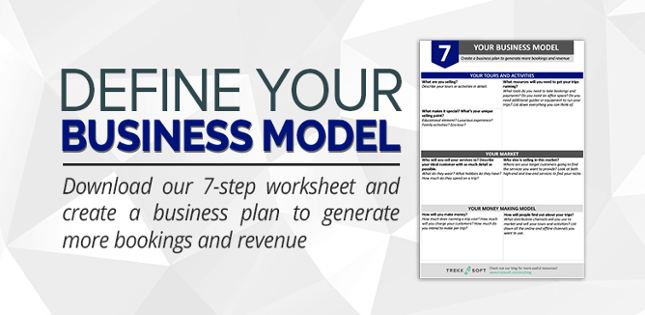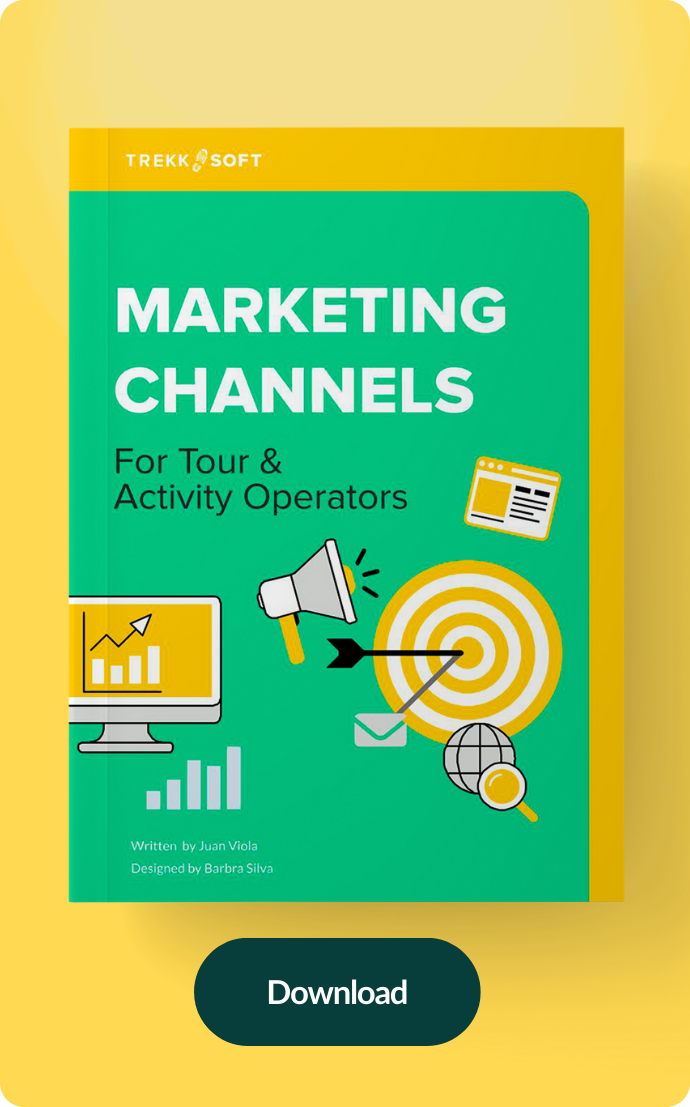Every business needs a business model.
According to academics, it is "the logic of the firm, the way it operates and how it creates value for its stakeholders."
It is a structured way to think about how your business operates and clearly highlights the business activities you do to generate a profit. It also gets you to think about the different elements that are crucial to keeping your business running.
Run through these 7 questions with me to define your business model to bring clarity to your business and understand it better.
Your tours or activities
1. What are you selling?
Get a clear idea of what your services are, describe your tours and activities in detail. If you don't know what you're offering, no one else will.
2. What makes it special?
What's makes your services different from current tours and activities in the market? What's your unique selling point? Here are some ideas:
- You provide a unique educational element about the destination
- You provide a truly luxurious experience
- You provide a budget activity
- Your business focuses on sustainability and conservation efforts
- Your activities double up as kill training programmes
- You are able to provide a truly authentic experience by bringing travellers to remote places
- Your services are highly specialised and unique

3. What resources are key to running your trips?
Run through an entire trip starting from the moment you meet up with your customers to the moment to leave them, what will you need for your trip to run smoothly?
For example, on a walking tour, your customers would most probably appreciate a coffee or snack stop, as well as a quick bathroom break. What cafes or restaurants would you walk past during your tour? You will probably need to partner with the owner to get permission for your customers to use the facilities there.
What about a scuba diving trip? You'll most probably need a boat, scuba diving equipment, a few instructors and all the necessary certifications.
List down all the resources you'll need. It'll help you calculate the cost of running a trip later on.
Your market
4. Who will you sell your services to?
Taking into account your unique selling point, who do you think your tours or activities are best suited for? Who's your ideal customer?
If you don't know who your services are created for, how will you sell it to them effectively? Are your tours catered to Baby Boomers? To families with young children? To teenagers? To solo travellers? To environmentally conscious travellers?
Use these prompts to create the ideal customer you want to attract to your business.
- How old are they?
- Do they have kids? How many?
- What sort of jobs do they hold?
- What kind of holidays do they take? Adrenaline fuelled adventure or lazy beach breaks? Or something in between?
- How much would they spend on a holiday?
- Do they travel with their family or alone?
- What hobbies do they have?
- What languages do they speak?
The better you know your ideal customer, the better prepared you are to created tours and activities for them, communicate to them and sell to them.
Download a free worksheet: Get to know your customers with these 35 questions

5. Who else is selling to this market?
Get to know the other players in the market. Do your research on all the other companies offering similar services in your destination and in similar destinations.
Ask yourself this: Where are my ideal customers currently going to find the services I intend to provide?
Research on all the high-end and low-end alternatives to your services to find your niche.
If you run a surf school in Seminyak, Bali, your competition might will be other surf schools in Bali and might extend to surf schools in Australia and along the beaches of France. Your job is to understand why your ideal customers are choosing one option over the other, and then figuring out how to carve out a niche in this same customer segment.
Your money making model
6. How will you make money?
The second most important question you'll ever ask as you build your business.
Calculating your costs
Referring to your answer to question 3, you should have an idea of all the resources you need to run your tours and activities. This should also give you an idea of how much your trips will cost to run.
Say you run a boat tour, you will incur the cost of buying the boat, maintaining the boat, fuel for the boat and a guide.
How much does all of that cost? How many people can you fit on the boat? How much do you need to charger per person to break even? How much profit do you want to make on top of that?
On top of that, what other overhead expenses will your business incur? Do you need an office space? Insurance? Web hosting fees? Commission to resellers?
Again, list down everything that contributes to the cost of running your tours and your business.
Deciding on the right price
With all your expenses calculated, how much profit would you like to make? 20%? 40%? I'm not here to tell you what you should or should not charge your customers.
Instead, look at what other businesses are doing and how you intend to position yourself in that market.
Read more: 5 tips to find the right price for your tours

7. How will people find out about your trips?
This is the most important question you'll have to ask yourself over and over again throughout the course of running your tour or activity company.
How do you plan to market and sell your tours and activities? What marketing channels will you use to get word out about your services?
A good tip is to identify the channels your ideal customers use to plan their trips and work out a marketing strategy that incorporates those channels.
Ideas for marketing channels:
- Social media - Facebook, Instagram, YouTube
- Email marketing - reaching out to old and new customers
- TripAdvisor - updating your profile and responding to both good and bad reviews
- Website - Building a great website and integrating a booking system onto your website
- Online travel agents or online marketplaces - TripAdvisor Experiences, Musement, Expedia Local Expert, Get Your Guide etc.
- Offline - Promoting to walk-ins or at visitor information centres
- Partnering with other tourism companies - accommodation providers or other tour or activity companies
Read more: How to create a marketing plan for tour and activity companies
Take action today. Download this free worksheet to get started.




